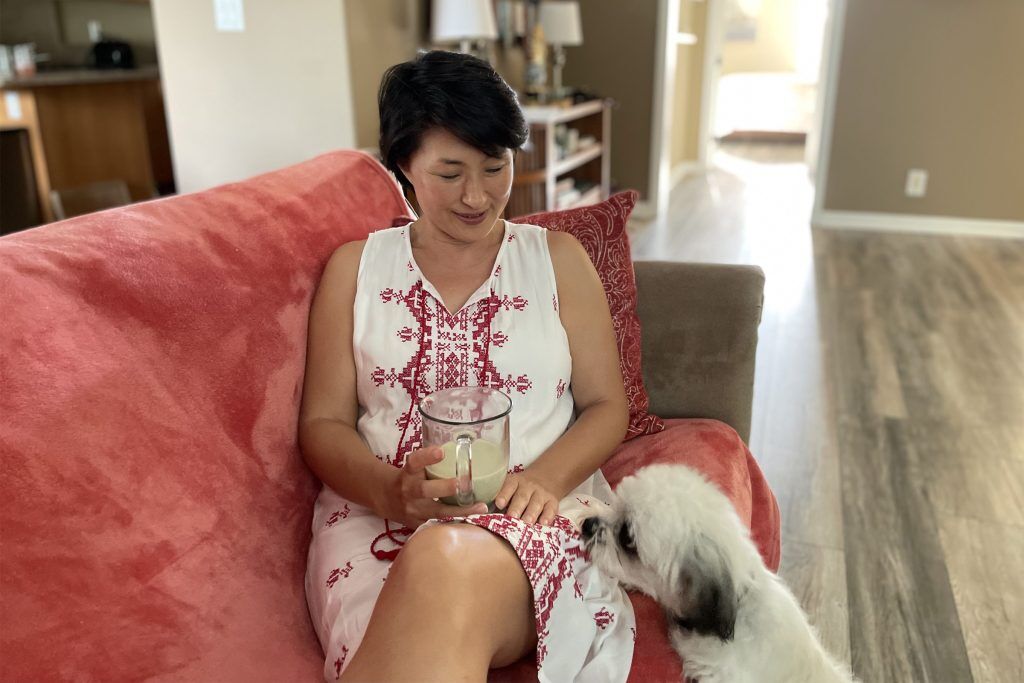As a society, we’re taught that we’re valuable when we’re doing. It’s easy to get caught up in the constant wheel of creating, producing, making things happen. To really let go of this constant need to be engaged, to stop and do nothing, is actually a reversal in that life-long conditioning.
To help us let go further in some of those beliefs, we’re going to discuss seven fear-based beliefs that keep us from fully resting, and how to get real rest.
Unconscious Beliefs That Keep Us From Resting
All of us have unconscious beliefs that can prevent us from going deeper into meditation. It keeps us from being able to receive the full benefits of restful practices. At least 30% of the American population has issues sleeping, and almost 70% have issues sleeping at least once a week. When we don’t get good sleep, we don’t feel well. Our mind can become agitated, which agitates our movements and actions, and stops the body from turning on the relaxation response.
The relaxation response, which occurs during deep sleep and meditation, is what tells the body that it’s safe to let go and return to balance. So when we don’t have that good rest, we become exhausted. We develop chronic fatigue and irritation.
Learning How to Meditate Better
Many of us feel deeply uncomfortable with the prospect of being alone with ourselves and with our own thoughts. This is meditation. Letting go and choosing not to always do, do, do, and go, go, go. Choosing to release all those efforts, that sense of achievement, of going, of producing. When you meditate, you’re releasing all of that and calling on a completely different kind of energy, a Yin-based energy. You’re moving from Yang, which is all action, to Yin, complete non-doing, receptivity, and being.
In order to help us move into that space, we need to become aware at a deeper level. We need to become aware of the emotions, beliefs, and thoughts that prevent us from entering that space. What often ends up happening is that people are unable to meditate because they’re nervous, restless, or agitated, and they don’t take time to examine that agitation.
They just keep going from here to there, their schedule booked solid, because there is a feeling of insecurity running them on a deeper level. But they don’t take time to examine, why are they running so fast? Where are they truly going?
All of that energy needs to be examined. This is where meditation can serve us.
That kind of frenetic energy is anxiety. It’s fear-in-action. It’s the need to fill up the space unnecessarily.. to always be doing something, to be consuming, even just reading or watching TV. Many of us aren’t even aware of this constant need to be busy.
We’ve been taught this Protestant work ethic our entire lives, that we need to be doing something in order to be valued. But there is value in doing nothing. It’s okay to rest and just be. In fact, there is profound value in doing nothing.
If you really want to progress inwardly, spiritually, and personally, the way to go is within, to slow down, to stop, and be still.

Seven Fears That Prevent Us From Getting Better Rest
Meditation is an opportunity to raise our awareness. We can pull ourselves out of all the automatic doing, including all the distractions, all the places we could go.]It is in the space of non-doing where we can start to receive clarity and focus. It is in this space where we can pull all our energies together and focus them like a laser.
This is the perfect time to think about what’s really important, how you want to be engaging all your energies, and how to get real rest. So let’s take a look at the seven fear-based beliefs that can prevent us from letting go and resting.
Fear 1: I’m Not Enough
The first belief is, “I’m not enough”. You may believe you’re not enough when doing absolutely nothing. For us to receive the benefits of rest and meditation, it’s important that we have strong self-esteem and confidence. Just because you’re not doing anything doesn’t mean that you’re any less valuable. You’re still enough.
It’s OK to do nothing. Oftentimes, when people meditate, they think it’s not enough. That they’re not getting anything from it. That attitude keeps them from going deeper, or even from starting a practice. The feeling is enough to keep you locked in to going, going, proving, performing, achieving, because you’re always trying to fulfill some “enough-ness”.
Fear 2: Guilt
The second fear is guilt. It’s easy to feel guilty when you start to experience a lot of pleasure from doing absolutely nothing. It’s possible through meditation to begin receiving energy, a blissful, peaceful energy. It’s pleasurable, and you enjoy your practice. There is a guilt that can come with that, thinking, “I’m doing nothing when I should be doing something”.
It’s easy to guilt-trip yourself into thinking that you should be doing something better with your time.
Fear 3: Letting Go of Control
We often think that, if we let go of control over everything and do absolutely nothing, that the world will fall apart in our absence. The belief is that you need to be there with everybody else, externally, all the time, so that things go smoothly — to make things happen.
But there is another belief that says, if I really let go into my own space, my own center of peace, then chaos is going to result. Something bad will happen because I released control over the external things. We focus on people, projects, and workplaces, instead of learning to relinquish control and become centered.
Fear 4: Being Lazy
The fourth fear is the fear of being lazy. You may think that, if you really let go into resting and let yourself enjoy doing nothing, then you will become a lazy couch potato.. The fear of being lazy, of being perceived as lazy, is also related to the fear of not being valuable or lovable. That if you’re lazy, you won’t be able to pull yourself out of it.

Fear 5: Low Self-Worth
Number five is the need to prove our sense of worth, to ourselves or to others. This is related to the first fear, of not being enough. This proving energy has been reinforced through our upbringing, because we were often rewarded when we did something our parents liked, or punished if we did something they disapproved of.
We’ve been taught this whole way of living life from an external perspective, of what it means to be loved when you do something right, good, or useful. We’re subtly programmed to think that when you’re doing nothing, you’re not worthy to exist, that you have to keep proving yourself, to work for your existence.
Fear 6: Fear of Feeling
Number six is the fear of feeling. Being afraid of feeling yourself and everything that you feel. Meaning that, when we sit in meditation, we begin to feel all our restlessness. All that anxiety begins to increase, because when you’re still, your awareness becomes heightened.
One of the reasons why people become so distracted is that they’re afraid to feel their feelings. Anxiety is like a mask, or a symptom. It’s a cover for deeper, unfelt emotions like stress, grief, anger, or jealousy. When we don’t allow ourselves to feel those deeper, darker human emotions, we keep ourselves from releasing that tension and all the related underlying feelings.
It takes a huge amount of energy to keep a cap on those feelings, and it becomes exhausting. Think about the energy it takes to clench your fists for a long time. Through rest and meditation, you can release the emotional tension just like releasing those muscles in your hands.
Fear 7: Fear of Change
The last fear-based belief is the fear of change, of transformation. When you let yourself rest and recover, and return to balance, and you actually come back as a new person. You feel that your ego has less of a hold on your energy. Your life force energy begins to flow through you, that lightness, radiance, and health. There is a change that comes every time you sit or rest; you feel more like yourself. You become more whole, more energetic.
Getting Good Rest Keeps Us Healthy
Getting good rest is critical because it’s not only necessary for our physical health, but for our overall well-being. It helps us to feel lighter, to not take life so seriously, to have more energy. Rest has many benefits, but the most important is that it’s healthy. It can help alleviate the fears we just discussed by simply cancelling them out. For example, just getting good rest helps you feel worthy of getting good rest.
Even when you’re doing nothing, or haven’t achieved a lot, or proven yourself, it’s OK to let go. It’s OK to do nothing, and to take that space without an agenda, or having to accomplish anything.

How to Have More Energy Through Meditation
There are a few techniques to help you get good rest and rejuvenation. Just to name a few:
Work With a Meditation Coach or Guide
One great way is to have a guide or a coach who actively works with you, training you to develop this muscle of rest. A guide can help focus your attention more readily, to shift into that receptive state.
Listen to Guided Meditations
You can also listen to meditations, hypnosis, or guided healing. There are many great videos and recordings for free on websites like YouTube. You can also Google what you need specifically, such as muscle relaxation.
Practice Restorative Yoga or Qigong
Restorative yoga and Qigong promote Yin energy. We need both Yin (feminine) and Yang (masculine) energy. Even when you’re exercising, it helps to get your heart rate up. But it also helps to learn how to calm down.
Restorative yoga puts you into the relaxation state. It activates the parasympathetic nervous system, or the relaxation response, telling your body it’s OK to let go and eliminate toxins, and to return to homeostasis.
Practice in a Group
We may not be able to do this physically, especially right now with the Covid pandemic, but you can still engage with teachers and groups online. See if any classes you’re interested in are available online, or if they have recordings you can access from home.
Those are some, though certainly not all, of the ways that you can begin to learn to enter deep rest for yourself. No matter how you choose to develop your practice, practice actively and remember to value getting rest. That time of meditation or relaxation is a sanctuary, a peaceful time of non-doing for yourself. And that’s just as important as any active task you might accomplish in the rest of your life.
This is copyrighted material from https://www.Suraflow.org (Sura Center, LLC). If you are viewing this on another site, they are in violation of copyright law. All websites who infringe on our copyrighted material will be reported and legal actions will be taken. Your website will be reported to Google as well as your hosting provider. Please remove any published material from Suraflow.org from your website as soon as possible.

